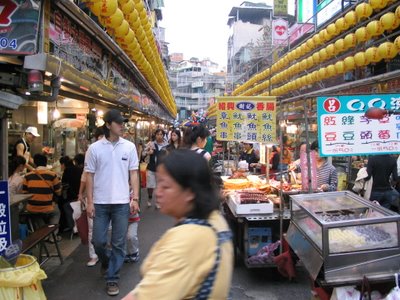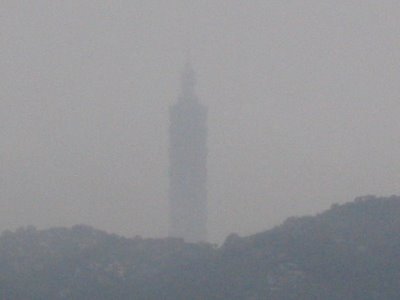Yesterday--April 14, 2006--before catching my flight I stopped by the Taiwanmex. After talking with Magos for awhile I met the owner of
Benjowski, a tea shop in Berlin. We had a very interesting chat, and he seems to have lived a fascinating life. He told me that before the Berlin Wall came down, he had lived in the same neighborhood where Bertolt Brecht--and over a century earlier, Hegel--had lived.
That is the same neighborhood where I had another remarkable encounter. I was walking the streets not far from Humboldt University with my Lonely Planet in hand, waiting to meet with Poul Andersen, a Danish scholar of Daoist ritual (now in Hawai'i). I must have been looking at my tour book, attempting to locate one or another site on a map, when an elderly woman approached me. I forget her name, but her life was also like a story. I didn't understand what she said when she first approached me; she spoke to me in a mixture of French, German, and English. However, after some time, she honed it to a mode I could comprehend.
She said, "I always see people walking around with these tour books. I have lived in this neighborhood all my life and know more about it than any of those books (Direct quotation from memory)." She than proceeded to show me around and to tell me her story. She took me to the cemetary where Brecht and his wife, Hegel, a famous architect, and many other brilliant souls, were buried.
She had lived in this neighborhood throughout the Nazi and Communist eras. Her father was Jewish (taken to a concentration camp) and her mother Protestant. Both parents taught her to respect both religions and gave her the freedom to choose which to practice, or not, when she was ready to decide. She told me much else, though much of it is forgotten, this being the first time I have tried to write it down.
She also wrote down on a piece of paper a quote by Martin Buber, one which, despite all I have forgotten, has remained forever fixed in my mind:
Alles wirkliche Leben ist Bewegnung
(Her translation: "All real life is encounter.")
Back to Benjowski. Frank Benjowski (I hope he doesn't mind me repeating his story here) left that neighborhood and traveled to Hungary and then to Bulgaria and finally to West Germany, rather than risk being shot trying to get over the wall. I don't know how long it was after the wall came down that he opened up his tea shop on Danziger Strasse 3, Berlin 10435, nor do I possess the details about how he became interested in tea (I guess that is also an
encounter).
Frank travels around the world to buy tea for his shop, and to learn how different cultures view, grow, and drink tea. He has traveled a lot in China, especially in the Southwest, and among different minority groups (including Yao), looking for tea, and has learned from tea connoisseurs who have shared their wisdom with him.
Although Frank doesn't speak Chinese, he travels in China with an interpreter from Hangzhou (Her family is from Hainan Island) who he met in Kunming. He was trying to order Tie Guanyin tea at a shop, but nobody understood what he was trying to say. Then, she helped him out, and the two of them soon discovered each others' interest in tea. Yes, another encounter. Life is all about them.
Frank also told me about an experience in Xishuangbanna (Sipsongpanna), in which he walked up to a bulletin board and saw a little note that said: "If you want to see the real Xishuangbanna, call [this number]." Frank called that number and, I assure you, had an interesting experience. If someone offers you the opportunity to discover the real or authentic place where you are, it would be wise, though risky, to take them up on the offer. That is a person who recognizes the importance of the place, who has lived there all his/her life, who grasps its essence, and who wishes to transmit.
I had a similar experience on the southeast coast of Taiwan in the summer of 1996. I traveled down there, planning to sojourn around the entire island, though for three weeks, I didn't leave the Taidong area.
The night before the particular experience in question I was sitting at a table outside a restaurant, eating my dinner. About four or five middle aged women sat at a table next to me. Within a short interval after sitting down, they noticed my presence (Many more people approached me in Taidong than ever had in Taipei. I was a curiosity there--in Taipei a mere fixture of everyday life) and offered me food and toasted me with plenty of liquor. One of the women said: "All within the four seas are brothers" (
sihai zhi nei, jie xiongdi四海之内皆兄弟).
The next day, after buying a plane ticket to Lanyu Island, I went to another restaurant and ordered water dumplings. After eating but a few dumplings, another group noticed me sitting there alone, and of course started to offer me food and drink, and ask me loads of questions.
With the passage of time, one of them uttered a question which had the effect of delineating that moment as a break with previous moments in my life. He said: "Do you want to see the real Taiwan, the Taiwan of the mountain folk," the people known in Taipei as aboriginals (
yuanzhumin原住民). He said his friend, a taxi driver, would take me into the hills. I was a little worried because in America I was taught as a child not to speak with strangers, and all those present had been drinking. After thousands of milliseconds of consternation, I accepted and embarked on an adventure.
We drove on winding, mountainous roads. At one point, we stopped at a house, within which we drank Taiwan beer and ate sushi. No, it was not wise to go on this journey, but I seemed to have lost the capacities of judgement, so intent was I on discovery.
We got back in the car and drove on. Alas, after passing a statue of a baseball player with a bat, we arrived at what I soon discovered was the Bunun Tribal Area. The car stopped and a beautiful woman, dressed in traditional aboriginal clothing including a hat, approached the car. She spoke with the driver; then, in perfect English, she said to me: "This man is drunk; you'd better get out of the car." I did, and after a brief stint on Lanyu Island (since I had already bought the plane ticket) I returned to the Bunun Tribal Area, where I stayed for three weeks, volunteered in their cafe, helped them pick weeds, watched and listened several nights to their aboriginal song and dance show, went to their church, became friends with them, hiked up into the mountains to take pictures of a traditional Bunun home where there were still people living.
During that period in my life I was reading a lot of Tao Yuanming; I brought along with me a book of translations of all of Tao Yuanmings writings. Ever since I had read the Peach Blossom Spring during the second semester of classical Chinese, I had been intrigued, and as I sat there in that place, I couldn't help but liken my own experience there to that of the fisherman who entered a grotto at the fountainhead of the spring. Coming out the other side of a dark passageway at the base of the mountain, he discovered a community of people who had left the world after the first emperor rose to power.
On another occasion, I was sitting there in the aboriginal village reading my Tao Yuanming poems with the mountains in the background. I felt a movement in my sandals under my feet and I spastically kicked my foot out and a
praying mantis went flying several feet. Then, the staring contest began. It started to walk towards me and I retreated some, afraid it might bite me. When it stopped, however, I started to approach it, and it would retreat. We were both curious and afraid of each other. I had never before nor have I since had this kind of experience with an insect. But, you can say, that was one more encounter in my life.
Isn't that what so many stories in ancient and medieval China centering on the Mandate of Heaven are about--encounters? Encounters with anomalous creatures and divine beings by riversides and holy texts in mountain grottoes and landscapes hidden from conventional eyes. Yes, life is all about encounters.








